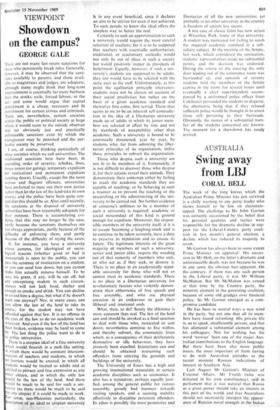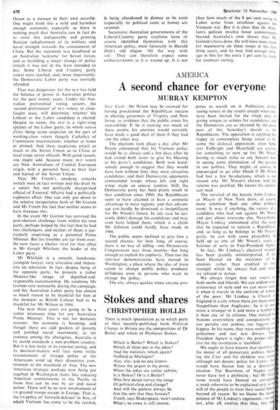AUSTRALIA
Swing away
from LBJ
CORAL BELL
The week of the long knives which the Australian Prime Minister has just survived is a chilly warning to any party leader who shows himself to be low on electorate- appeal. The challenge to Mr John Gorton was certainly occasioned by the belief that his personal qualities and tactics were responsible for the dramatic decline in sup- port for the Liberal-Country party coali- tion in last month's general election, a decline which has reduced its majority to seven.
Mr Gorton has always been to some extent Prime Minister 'on approval'. His succes- sion to Mr Holt, on the latter's dramatic and unforeseeable death, was not because he was in any sense the obvious heir-apparent. On the contrary, if there was any such person in the Liberal party, it was Mr William McMahon. But Mr McMahon was vetoed at that time by the Country party, the minority element in the governing coalition, because of some old grudges over financial policy. So Mr Gorton emerged as a com- promise candidate.
He has been in several ways a new wind in the party, but not one that all its mem- bers have found refreshing. His private life is, so to speak, insufficiently private, and that has alienated a substantial element among his colleagues. Not for nothing has the word 'wowser' been one of the major Aus- tralian contributions to the English language. But there have been also more public issues, the most important of them having to do with Australian attitudes to the recent insistent Russian indications of interest in Southern Asia.
Last August Mr Gorton's Minister of External Affairs, Mr Freeth (who was defeated in his own constituency), said in parliament that it was natural that Russia as a great power should take an interest in this part of the world, and that Australians should not necessarily interpret the appear- ance of Russian naval strength in the Indian
Ocean as a menace to their own security. One might think this a mild and harmless enough statement, especially as there is nothing much that Australia can in fact do to resist this indisputable and growing Russian redeployment of its military and naval strength towards the containment of China. But the statement was headlined as an Australian 'welcome' for Soviet forces, and as heralding a major change of policy (which it was not in the least intended to do). Some Liberal and Country party voters were startled, and, most importantly, the Democratic Labor party was mortally offended.
That was dangerous, for the DIP has held the balance of power in Australian politics for the past twenty years. Under the Aus- tralian preferential voting system, the 'second preferences' of DIP voters, in close- fought seats, will determine whether the Liberal or the Labor candidate is elected. Despite its name, the DIP is a right-wing splinter of the Labor party, its whole raison d'être being acute suspicion on the part of working-class voters (largely Catholic) of Communist machinations, whether at home or abroad. And these suspicions attach as much to the Soviet Union as to China or local trade union officials. With good reason, one might add, because many DIP voters are New Australians of Central European origin, with a personal basis to their fear and hatred of the Soviet Union.
Thus Mr Freeth's anodyne remarks (which were in fact written into the draft by a senior but not politically sharpwitted official of External Affairs) had a politically explosive effect. One can only put down to the relative inexperience both of Mr Gorton and Mr Freeth the fact that neither seems to have foreseen this.
In the event Mr Gorton has survived the post-election challenge from within his own party, perhaps helped by the fact that he had two challengers, and neither of them is par- ticularly inspiriting as a potential Prime Minister. But his troubles are far from over. He now faces a likelier rival for that office in Mr Gough Whitlam, the leader of the Labor party.
Mr Whitlain is a smooth, handsome, youngish lawyer, very articulate and impres- sive on television. In fact, despite being of the opposite party, he projects a rather Menzies-like image of dignified-and- responsible-statesmanship. He outshone Mr Gorton very noticeably during the campaign, and the Australian Labor party has almost as much reason to be thankful for him at the moment as British Labour had to be thankful for Mr Wilson in 1966.
The next three years are going to be a rather strenuous time for any Australian Prime Minister. This is not for domestic reasons: the economy is booming, and though there are odd pockets of poverty and justified social resentment, as for instance among the aborigines, Australia is by world standards a non-problem country. But it is less lucky in its external setting, and its decision-makers will face some tricky reassessments of foreign policy as the Americans wind up their disastrous com- mitment to the mainland of Asia. The new American strategic package now being put together in Washington looks like reducing American commitments in the Pacific to those that can be met by air and naval power. There will be no new involvement of us ground troops except in Europe. That is, the us policy of 'forward defence' in Asia, of which Vietnam has come to be the symbol, is being abandoned in dismay as its costs (especially its political costs at home) are counted.
Successive Australian governments of the Liberal-Country party coalition have of course identified themselves with this American policy, most fatuously in Harold Holt's old slogan 'All the way with Lill'. They can therefore expect some embarrassments as it is wound up. It is not
clear how much of the 8 per cent swing to Labor arose from revulsion against the Vietnam war. But it is clear that Mr Whit- lam's policies involve fewer commitments beyond Australia's own shores than Mr Gorton's have done. He will have more room for manoeuvre on these issues in the next three years, and he may find enough mile- age in this for the extra 1 per cent he needs for eventual victory.







































 Previous page
Previous page